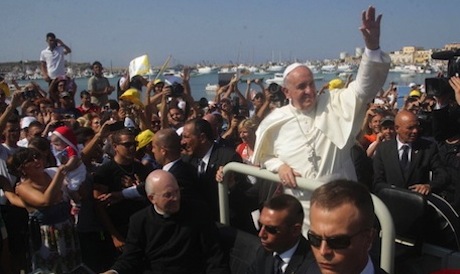In the first pastoral trip of his pontificate, Pope Francis travelled to a refugee centre in southern Italy and issued a heartfelt appeal against the “globalisation of indifference” towards migrants.
The Pope said he decided to visit Lampedusa, a small island with a population of 6000 and just 70 miles from Tunisia, after seeing newspaper headlines in June describing the drowning of immigrants when a boat sank offshore.
The thought of the tragedy was “like a splinter in the heart that causes suffering”, he said.
“I felt the duty to come here today to pray, to perform a gesture of closeness, but also to awaken our consciences so that what happened doesn’t repeat itself.”
After a flight from Rome, the Pope boarded a boat to arrive at the port of Lampedusa, pausing along the route to cast a floral wreath on the waters that have claimed the lives of thousands of migrants.
On arrival at the port he met a group of around 50 immigrants, many of them Muslims, living in reception shelters, and greeted them one by one.
Later, celebrating Mass at a soccer field, he remarked on the sad irony of “immigrants dying at sea, in boats which were vehicles of hope and became vehicles of death”.
To emphasise that he was there to mourn the dead and to encourage everyone around the world to examine their consciences about how they directly or indirectly contribute to the problems of immigrants, Pope Francis wore the purple vestments of repentance and used the prayers from the Mass for the Forgiveness of Sins.
In his homily the Pope spoke about the failure of Christians to recognise refugees and migrants as their brothers.
He decried the “culture of comfort” that “makes us insensitive to the cries of other people, makes us live in soap bubbles which, however lovely, are insubstantial”.
He said: “We have become used to the suffering of others, it doesn’t affect me; it doesn’t concern me; it is none of my business. The globalisation of indifference makes us all ‘unnamed’, responsible yet nameless and faceless.”
Sources:
Image: UCANews
